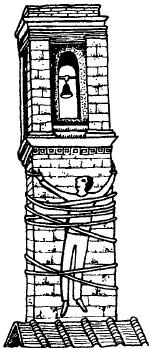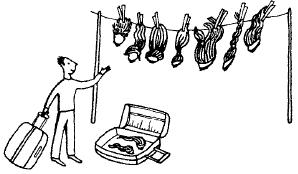
a travelling fool is better than a sitting wise persong
You can’t spend your whole life flopping around in one place. Sooner or later, whatever traveller’s nerves you may feel, you just have to up sticks and go:
gabkhron (Boro, India) to be afraid of witnessing an adventure
resfeber (Swedish) to be jittery before a journey
andlamuka (Tsonga, South Africa) to pack up and depart, especially with all one’s belongings, or to go for good
bishu (Chinese) to be away from a hot place in the summer
campanilismo (Italian) local pride, attachment to the vicinity (literally, bell tower-ism – referring to the fact that people do not want to travel so far as to be out of sight of the bell tower)

A journey’s a journey whether you are going near…
poronkusema (Finnish) the distance equal to how far a rein-deer can travel without a comfort break – about 5 kilometres (literally, reindeer’s piss)
tonbogaeri (Japanese) to go somewhere for business and come right back without staying the night (literally, dragonfly’s return)
… or far:
donde San Pedro perdió el guarache (Mexican Spanish) to the back of beyond; at the ends of the earth (literally, where St Peter lost his sandal)
tuwatauihaiw-ana (Yamana, Chile) to be absent a very long time and thus cease to remember or care for your country and people (as an emigrant might after a long absence)
travel (Norwegian) busy
crush (Romani) to get out
bias (Malay) deflected from its course
grind (Dutch) gravel
Some people just can’t wait to get going:
Tapetenwechsel (German) being bored with the place you’re in and wishing to go somewhere else (literally, let’s change the wallpaper)
echarse el polio (Chilean Spanish) to get out of town (literally, to throw out the chicken)
amenonéhne (Cheyenne, USA) to sing while walking along
henkyoryugaku (Japanese) young women who in their twenties and thirties rebel against social norms and travel abroad to devote time to an eccentric art form such as Balinese dancing (literally, studying abroad in the wild)
But it can get lonely out there, so consider taking a companion:
uatomoceata (Yamana, Chile) to pass your arm within another’s and bring him along, as friends do
adi (Swahili) to accompany a person part of their way out of politeness
Lebensgefahrte (German) one who travels life’s road with you
nochschlepper (Yiddish) a fellow traveller, tag-along, camp follower, pain in the arse (literally, someone who drags along after someone else)
ku-sebeya (Ganda, Uganda) to travel with one’s husband
Travel on two wheels is always economical, and can be more or less environmentally sound:
der Drahtesel (German) a bicycle (literally, wire donkey)
washa (Luvale, Zambia) a bicycle (from the sound it makes as it runs along a narrow path brushing against bushes)
stegre (Sranan Tongo, Surinam) to ride a bicycle or a motorized two-wheel vehicle on only the back wheel
bromponie (Afrikaans) a motor scooter (literally, a growling or muttering pony)
And though four wheels are faster, there is many a pitfall:
sakapusu (Sranan Tongo, Surinam) an unreliable vehicle, so called because you always need to get out (saka) and push (pusu)
galungkung (Maguindanaon, Philippines) the rattling sound produced by a loosely bolted car
der Frischfleischwagen (German) an ambulance (literally, fresh meat delivery van)
parte (Chilean Spanish) a traffic ticket; also a baptism or wedding invitation
gagjom (Tibetan) to set up a roadblock and then rob someone
Sometimes the greatest danger on the road comes from other users:
faire une queue de poisson (French) to overtake and cut in close in front of a car (literally, to do a fishtail)
Notbremse ziehen (German) to swerve away at the last moment (literally, to pull the handbrake)
shnourkovat’ sya (Russian) to change lanes frequently and unreasonably when driving (literally, to lace boots)
autogangsteri (Finnish) a hit-and-run driver
The Chinese particularly like car number plates with 118, which is pronounced yat yat fatt in Cantonese and sounds like ‘everyday prospers’; 1128 sounds like ‘everyday easily prospers’; and 888 ‘prosper, prosper, prosper’. A number plate with 1164 is not popular because it sounds like yat yat look say, which can mean ‘everyday roll over and die’.
A Hong Kong owner (i.e. a Cantonese speaker) would favour a number plate with just 32168, which sounds like sang yee yat low fatt, meaning ‘a very profitable business all the way’.
Japanese cars can’t have the licence plate 4219 because that could be read as shi ni i ku, which means something along the lines of ‘going to death’.
If all else fails there’s always public transport (with all the delights that that entails). As the Germans say, ‘We are all equal in the eyes of God and bus drivers’:
gondola (Chilean Spanish) a municipal bus
Lumpensammler (German) the last train (literally, rag collector)
Luftkissenboot (German) a hovercraft (literally, air-cushion vehicle)
Or perhaps it’s time to splash out on something special:
magimiks belong Yesus (Tok Pisin, Papua New Guinea) a helicopter
Japanese subways are so crowded that they employ special packers to push people on and others to untangle them and get them off when they get to a station. The pushers-on are addressed as oshiya-san (honourable pusher) and the pullers-off as hagitoriya-san (honourable puller).
The truth is that travel is rarely as glamorous as it’s portrayed. So whatever happens, keep your nerve:
far-lami (Old Icelandic) unable to go further on a journey
kalangkalang (Manobo, Philippines) to be overtaken by night on a journey with no place to stay and nothing to eat
asusu (Boro, India) to feel unknown and uneasy in a new place
bu fu shultu (Chinese) not accustomed to the climate or food of a new place (said of a stranger)
wewibendam (Ojibway, North America) being in a hurry to return home
And sometimes you will be surprised by unexpected rewards:
inchokkilissa (Alabama, USA) to be alone and experience the quietness of a location
uluphá (Telugu, India) supplies given to any great personage on a journey, and furnished gratis by those who reside on the route
Even if you never actually go:
kara-shutcho (Japanese) to pay or receive travel expenses for a trip not actually taken (literally, empty business trip)
Always remember that, as the French say, ‘À beau mentir qul vient de loin’, travellers from afar can lie with impunity:
iwaktehda (Dakota, USA) to go home in triumph having taken scalps

y aller par quatre chemins (French) to get there by four paths
iddur mal-lewża (Maltese) to go round the almond
å gå – som katten rundt den varma groten (Norwegian) to walk like a cat around hot porridge
menare il can per l’aia (Italian) to lead the dog around the yard
emborrachar la perdiz (Spanish) to get the partridge drunk